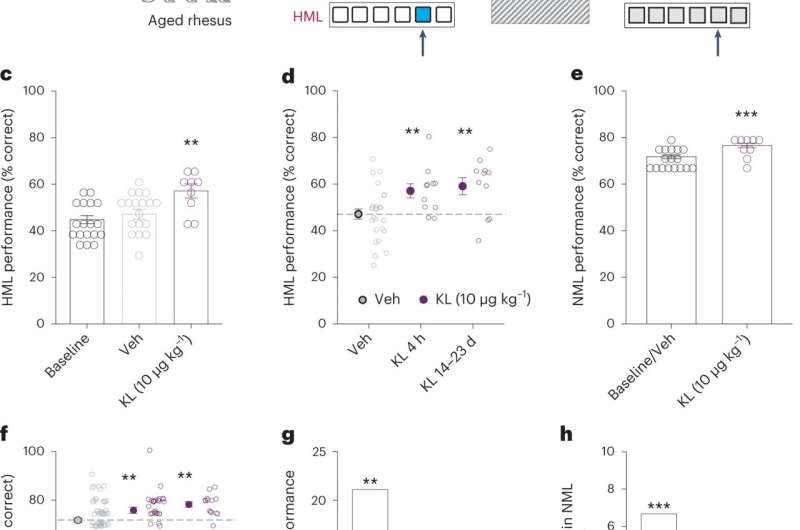July 4, 2023 report
This article has been reviewed according to Science X's editorial process and policies. Editors have highlighted the following attributes while ensuring the content's credibility:
fact-checked
peer-reviewed publication
trusted source
proofread
Injection of klotho protein into older monkeys found to improve cognitive decline

A team of health care specialists and neuroscientists affiliated with several institutions in the U.S., has found that injecting a protein called klotho into older rhesus macaques led to improvements in working memory and their ability to do certain tasks.
In their paper, published in the journal Nature Aging, the team describe the experiments they conducted giving the rhesus form of klotho to aging monkeys and what they found by doing so.
Prior research has suggested that klotho, which is produced naturally in the kidneys, circulates in the blood, and has an impact on both lifespan and general health.
Back in 1997, another team of researchers noticed that mice who lacked normal amounts of klotho tended to suffer from aging-like effects. They also found that older mice with higher levels of klotho in their blood, tended to live longer. Prior research has shown that klotho levels in humans tends to decrease in most people as they age.
In this new effort, the research team wanted to know if giving aging monkeys the protein would slow or restore cognitive function. They selected 18 rhesus macaques that were equivalent in age to humans that were aged 65 or older.
Each was tasked to make their way through a maze in order to find a hidden treat. They were then encouraged to repeat the maze to see how well they remembered the most direct path to the treat. Next, the researchers injected klotho into each of the monkeys—the amount raised their levels to what it was when they were infants. After four hours, the monkeys were tested again with different mazes. They were also tested several times over the following two weeks.
In looking at their results the team found that giving the monkeys klotho led to improvements in working memory. They also found that the monkeys saw more improvements when the maze paths were more difficult to remember, in some cases by as much as 20%.
The researchers also found that the effects of giving the monkeys klotho lasted for at least two weeks. They suggest their findings indicate that giving the protein to the monkeys led to cognitive improvement. More work needs to be done to find out if it can be given on a regular basis without causing harm, and if it would continue to provide improvements over time. If so, the team expect testing to begin with humans.
More information: Stacy A. Castner et al, Longevity factor klotho enhances cognition in aged nonhuman primates, Nature Aging (2023). DOI: 10.1038/s43587-023-00441-x
© 2023 Science X Network

















